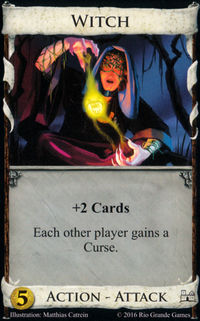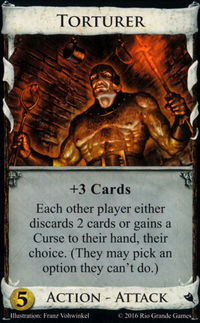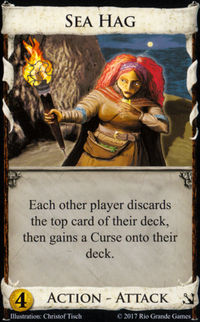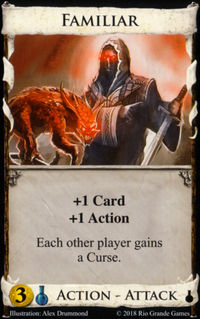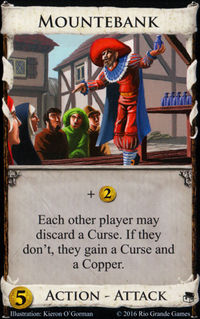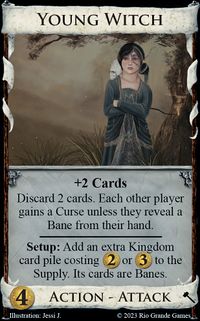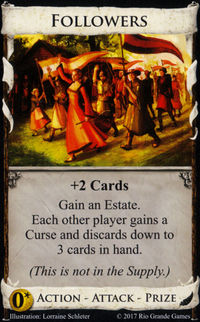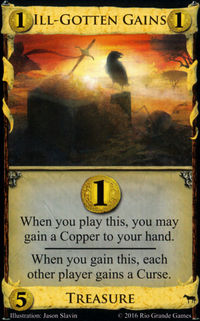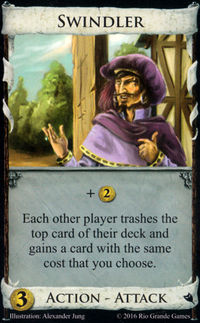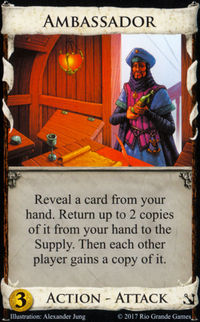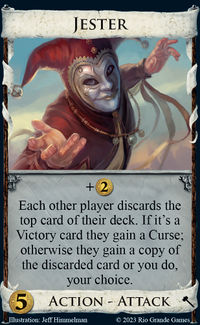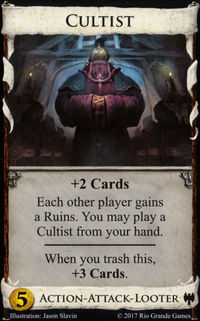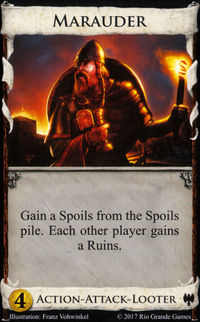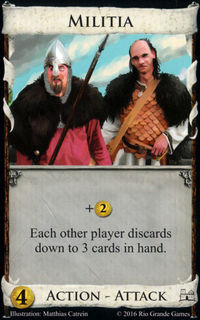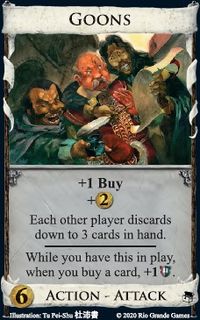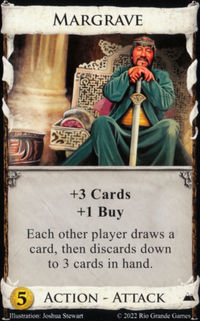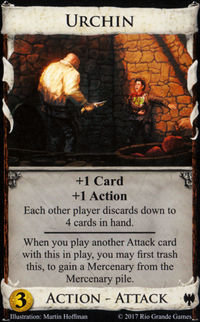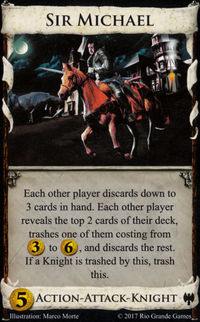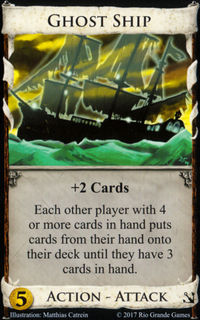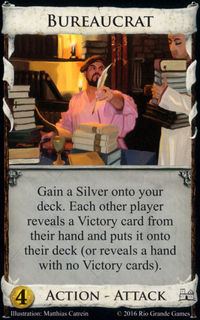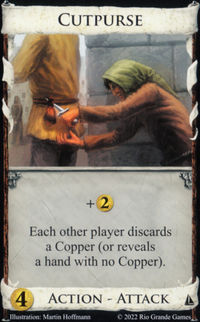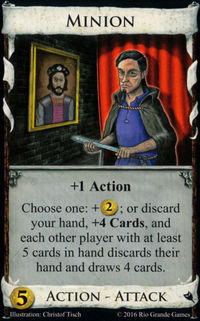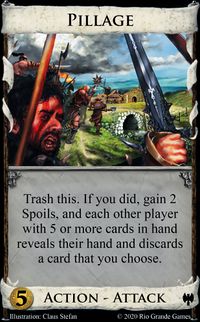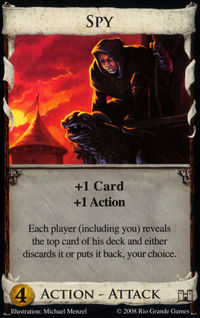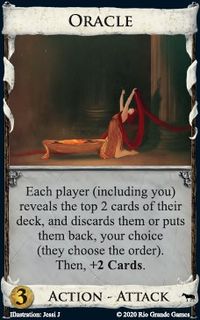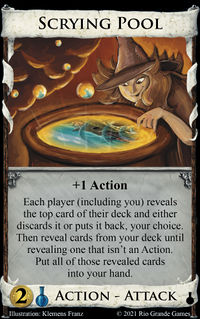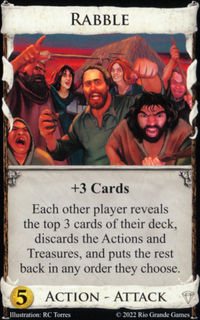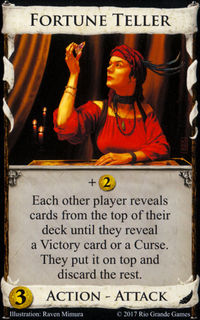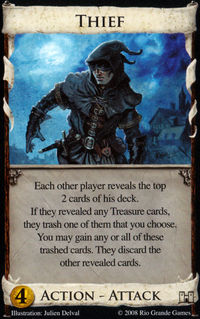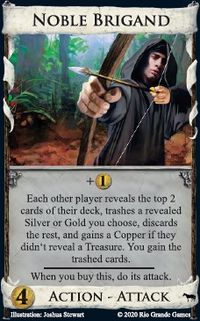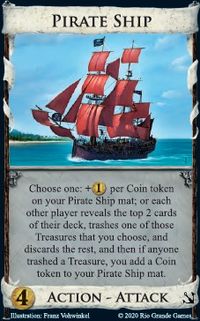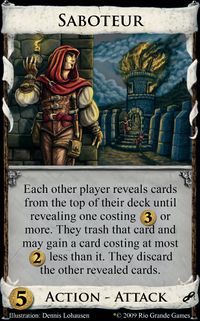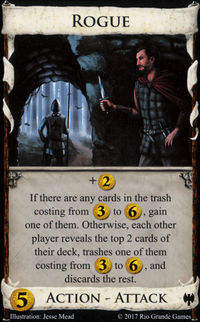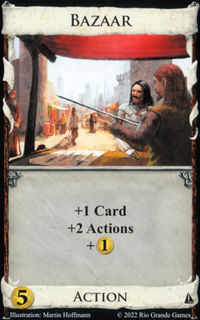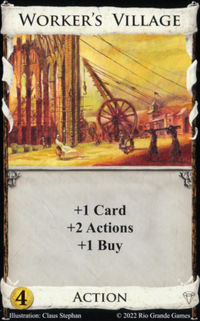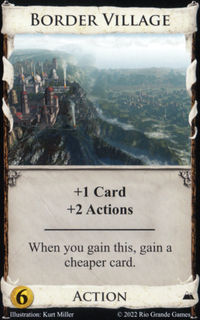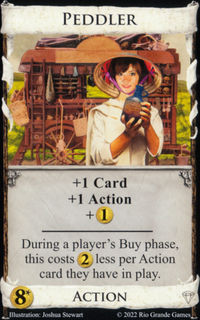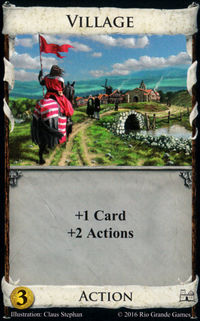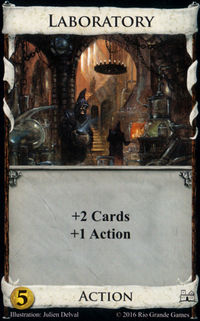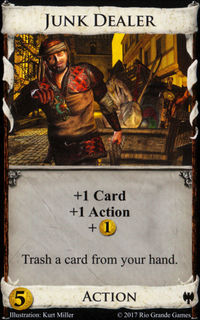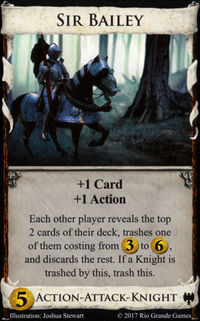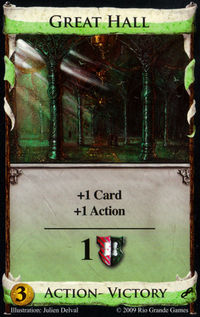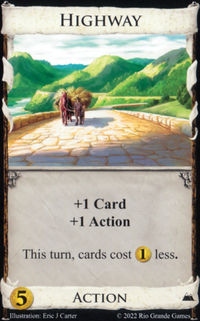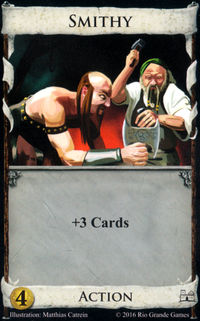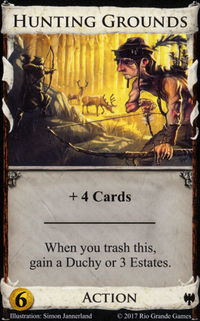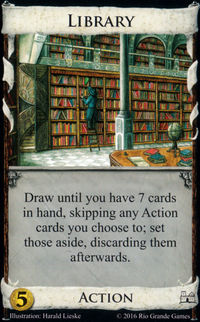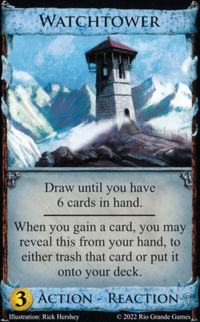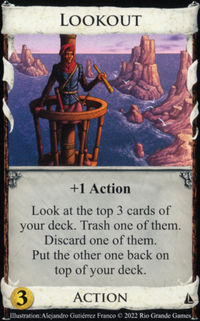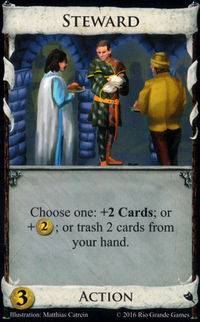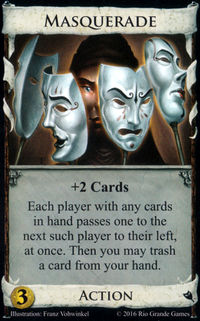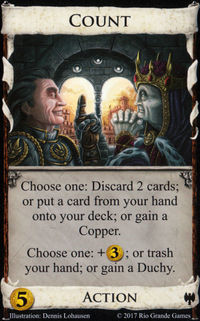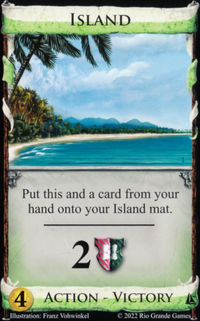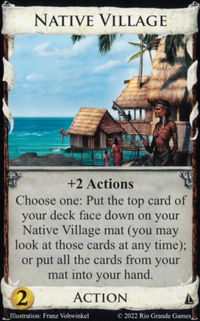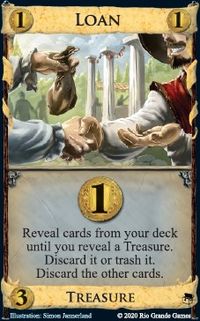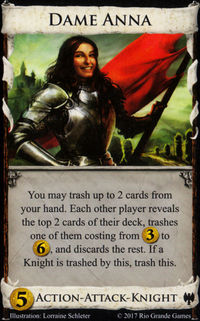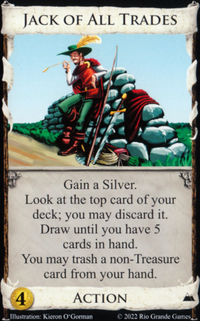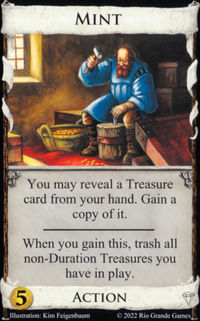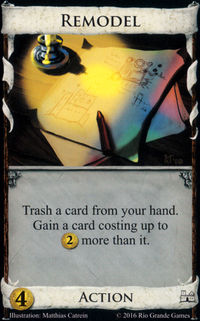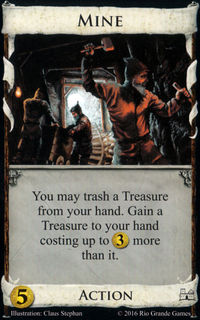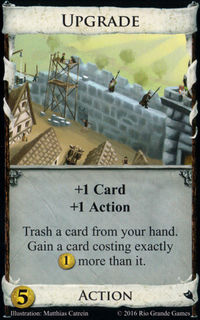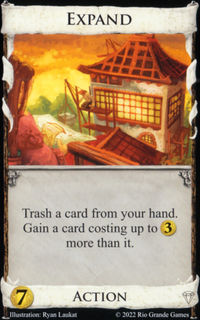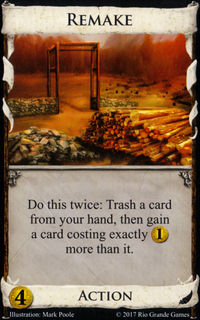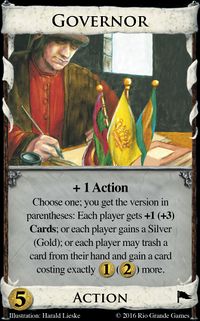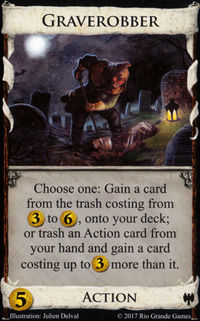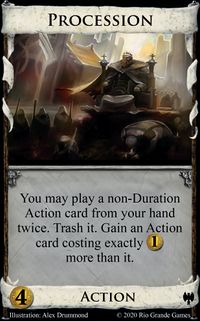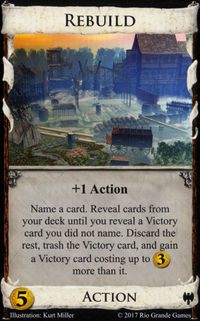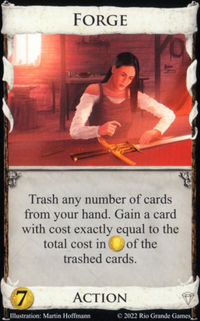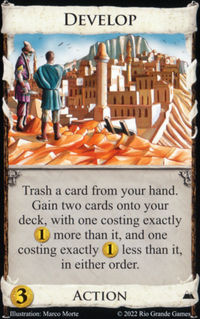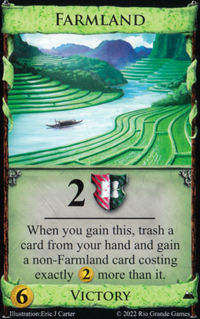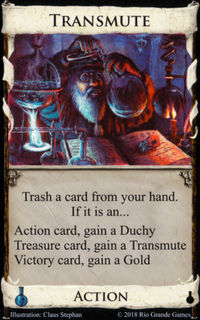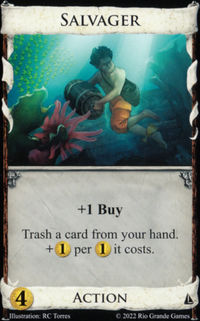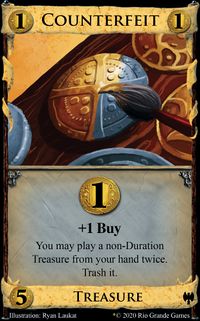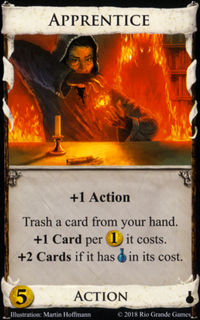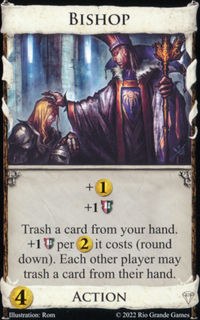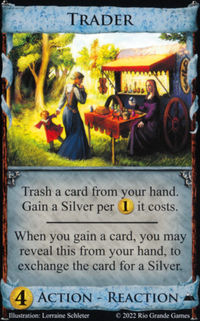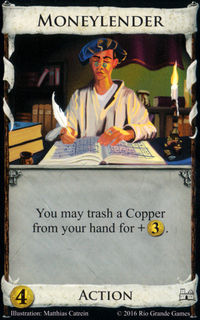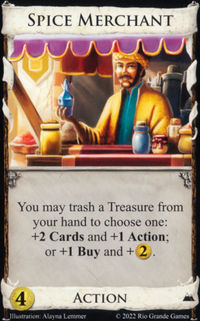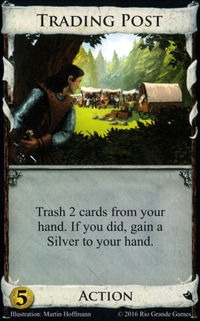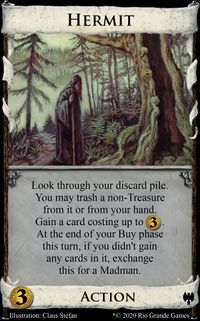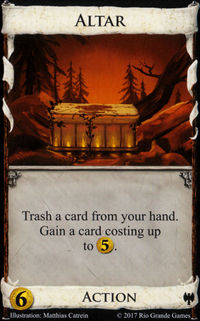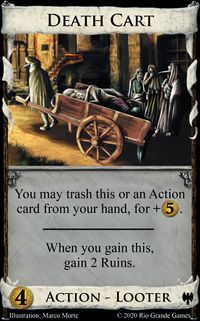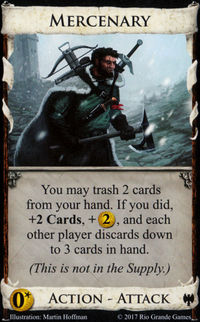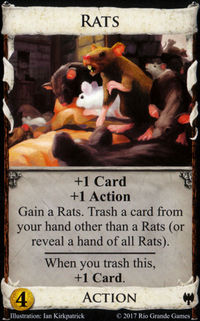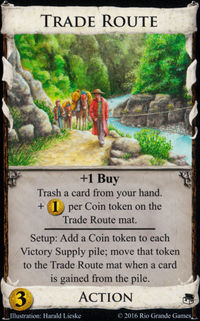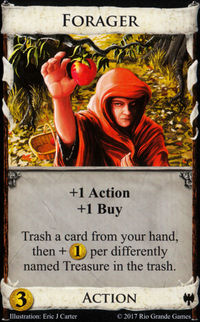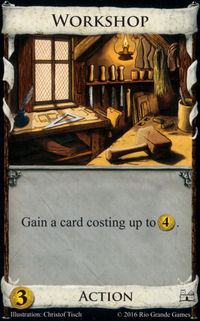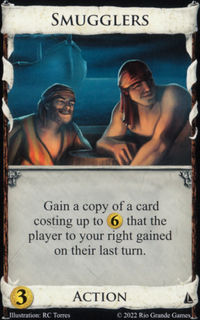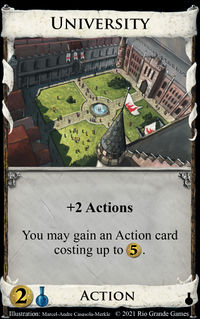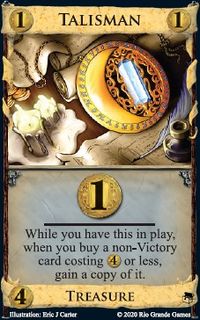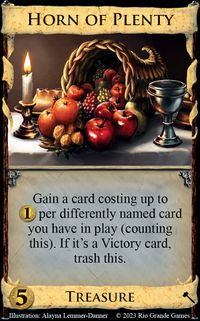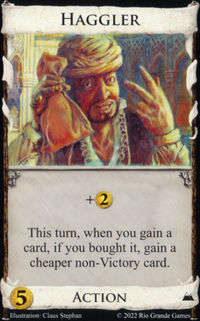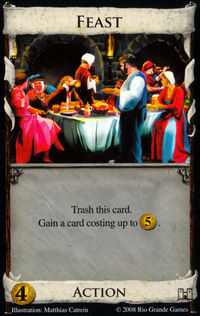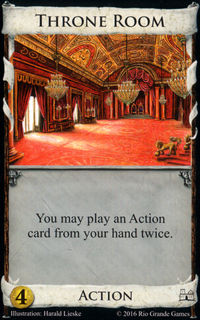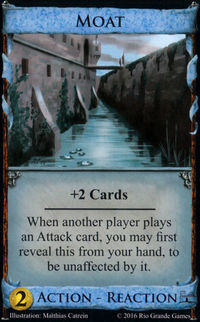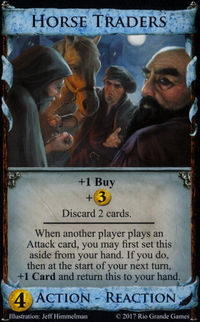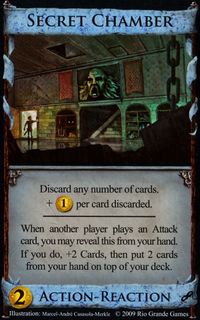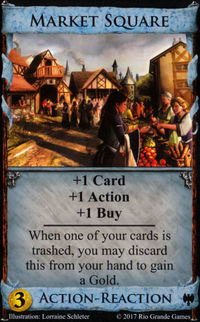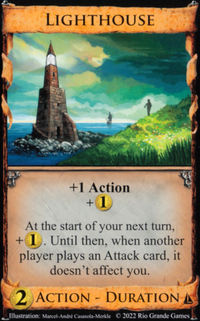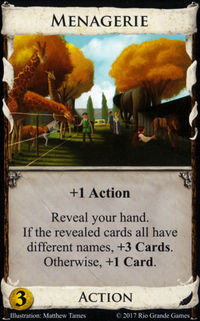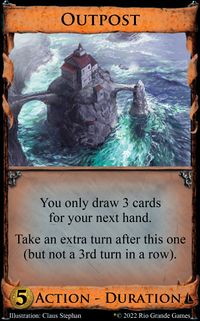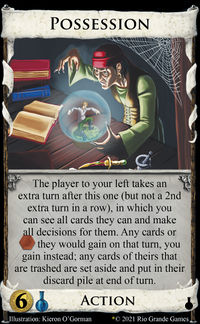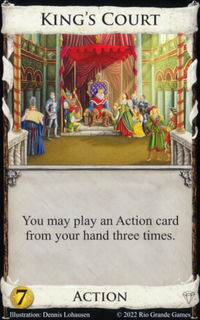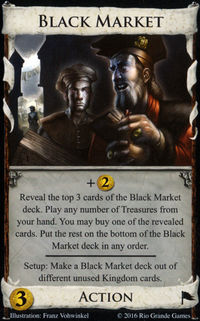Card Categories: Difference between revisions
mNo edit summary |
|||
| Line 28: | Line 28: | ||
These are Attack cards that trash valuable cards from your opponents' decks. Some of these are limited to [[Treasure|Treasure cards]], such as {{Card|Thief}}, {{Card|Noble Brigand}}, and {{Card|Pirate Ship}}. Others offer replacements that your opponents may choose (like {{Card|Saboteur}}) or that you may choose (like {{Card|Swindler}}). Another subcategory trashes only within a price range between {{Cost|3}} and {{Cost|6}} (like [[Knights]] and {{Card|Rogue}}). | These are Attack cards that trash valuable cards from your opponents' decks. Some of these are limited to [[Treasure|Treasure cards]], such as {{Card|Thief}}, {{Card|Noble Brigand}}, and {{Card|Pirate Ship}}. Others offer replacements that your opponents may choose (like {{Card|Saboteur}}) or that you may choose (like {{Card|Swindler}}). Another subcategory trashes only within a price range between {{Cost|3}} and {{Cost|6}} (like [[Knights]] and {{Card|Rogue}}). | ||
== Village == | |||
''Main article: [[Village (card category)]]'' | |||
Villages are cards that provide at least +2 Actions. Most of these cards have ''Village'' in the name and commonly facilitate [[engine|engines]] centered around [[terminal]] cards. However, many villages that come with additional bonuses (such as {{Card|Bazaar|coins}}, {{Card|Worker's Village|buys}}, or {{Card|Border Village|extra cards}}) which may aid many strategies. | |||
== Cantrip == | == Cantrip == | ||
| Line 40: | Line 47: | ||
Peddler variants are cantrips that produce money (notably Grand Market) or reduce costs (like {{Card|Highway}}); one way or another they make it easier for you to buy cards. | Peddler variants are cantrips that produce money (notably Grand Market) or reduce costs (like {{Card|Highway}}); one way or another they make it easier for you to buy cards. | ||
=== Non-terminal drawer === | === Non-terminal drawer === | ||
Revision as of 02:10, 16 September 2014
While analyzing the board at the start of a game, you often analyze each card by each functionality. This functionalities doesn't necessarily depend on the Card type and can be grouped into several categories.
Attack categories
Main article: Attack
Curser
Main article: Curser
Cursers are often the most important card to look for. Cursers are cards which have the potential to distribute Curses to other players. Curses are some of the strongest cards in the game, including Witch, Torturer, Sea Hag, Familiar, Mountebank, Young Witch, Followers, and Ill-Gotten Gains. The broader term is junker - a card which can distribute Curses but also other bad cards like Estate and Copper. All Cursers and Swindler, Ambassador, and Jester are junkers, among others. A card distributing only Ruins is also called a Looter (like its corresponding card type). Looters comprise Cultist and Marauder.
Handsize attack
Main article: Handsize attack
Handsize attacks are Attack cards that reduce the handsize of your opponents decks are called Handsize Reducers or Discarders. Usually your opponents can choose the cards to discard and never have to discard down to less than 3 or 4 cards in hand. Typical examples are Militia, Goons, Margrave, Followers, Urchin, and Sir Michael. Ghost Ship is a little different as it doesn't let your opponents discard the cards, they have to put them on top of their decks and it therefore messes with the tops of their decks too. Bureaucrat is similar although putting the Victory card on top of the deck hurts more than losing it out of the hand. Bureaucrat, Cutpurse, and Torturer are also the only discarding attacks that could stack down to less than 3 cards in hand - depending respectively on the number of Victory cards in hand, Coppers in hand, and the choice of your opponent. Minion doesn't let your opponent choose what to keep, similar to Pillage, where you can choose the card to discard.
Deck top attack
Main article: Deck top attack
Deck top attacks are Attack cards that mess with the top of your opponents' draw piles. Spy, Oracle, and Scrying Pool let you inspect 1 to 2 cards which you may discard, so that bad cards are likely to stay on top. Bureaucrat, Rabble, and Fortune Teller directly put Victory or Curse cards on top of their decks. Ghost Ship lets your opponents mess with their own decks because you make them put cards back on top.
Trashing attack
Main article: Trashing attack
These are Attack cards that trash valuable cards from your opponents' decks. Some of these are limited to Treasure cards, such as Thief, Noble Brigand, and Pirate Ship. Others offer replacements that your opponents may choose (like Saboteur) or that you may choose (like Swindler). Another subcategory trashes only within a price range between and (like Knights and Rogue).
Village
Main article: Village (card category)
Villages are cards that provide at least +2 Actions. Most of these cards have Village in the name and commonly facilitate engines centered around terminal cards. However, many villages that come with additional bonuses (such as coins, buys, or extra cards) which may aid many strategies.
Cantrip
Main article: Cantrip
Cantrips are Action cards which provide at least +1 Card and +1 Action. They are often considered to be harmless cards because they replace the card they took up in your hand and the action it used to play it. Cantrips are inherently non-terminal and can be extremely powerful if they have other bonuses, such as producing money (like Peddler), providing additional actions (like Village), providing additional cards (like Laboratory), trashing (like Junk Dealer), attacking (like Sir Bailey), cursing (like Familiar, or being worth ![]() (like Great Hall). Cantrips can usually safely be bought in multiples and played repeatedly within a turn.
(like Great Hall). Cantrips can usually safely be bought in multiples and played repeatedly within a turn.
Peddler variant
Main article: Peddler variant
Peddler variants are cantrips that produce money (notably Grand Market) or reduce costs (like Highway); one way or another they make it easier for you to buy cards.
Non-terminal drawer
Main article: Non-terminal drawer
Non-terminal drawers are cantrips that provide at least +2 Cards. They are often considered to be variants of Laboratory or to be handsize increasers, since you have more cards in hand after you played them than before. They can be chained together for megaturns and they can supplement many strategies, including Big Money.
Terminal drawer
Main article: Terminal draw
Terminal drawers are Action cards that allow the player to draw cards but that don't provide additional actions. Smithy and Hunting Grounds are pure drawers when played, but terminal drawers may also be Attack cards (like Torturer, Rabble, or Margrave). They pair well with villages and Big Money strategies.
Draw to X
Some cards draw you a non-fixed number of cards by drawing until your hand is a certain size. Library and Watchtower are the archetypes of this category. They are particularly useful with disappearing villages and in response to discard attacks.
Terminal Silver
Main article: Terminal Silver
Terminal Silvers are Action cards that provide no additional actions and produce , eliciting a direct comparison to Silver. Many Action and Attack cards are terminal Silvers and they can be crucial in strategies depending on sources of virtual money.
Trasher
Main article: Trasher
Trashers are cards with the ability to trash one or more cards from your own hand or deck. Trashing is a very strong move - often underestimated by beginners - because you remove low value cards from your deck so you can see your good cards more often. They generate a high density of quality. Because many cards that have this ability, they are often divided into subcategories.
Trash for no benefit
Main article: Trash for no benefit
Trash for no benefit cards are beneficial purely in the removal of unwanted cards from your deck. Chapel, Lookout, Steward, Masquerade, and Count belong to this category. Ambassador fits here too, although it doesn't trash your cards, but removes them from your deck (which has often the same effect). Island and Native Village aren't trashers either, but are often called pseudo trashers because they remove cards from your deck, but are returned to your deck later. Loan, Junk Dealer, Dame Anna, and Jack of all Trades also belong to this category because the benefits they provide don't depend on the trashing. Mint gets an honorable mention as it's trash for no benefit effect happens when you buy it.
Trash for benefit
Main article: Trash for benefit
Trash for benefit cards give a benefit dependent on the card you trash. Often, the benefit is another card and the dependence is on the cost of the trashed and gained cards; cards of this type are called remodelers. Remodelers comprise Remodel, Mine, Upgrade, Expand, Remake, Governor, Graverobber, Procession, and Rebuild. Forge is different as it may trade in multiple cards for 1 card. Develop works the other way around: it trashes 1 card for 2 cards. Farmland gets an honorable mention as it's remodel effect happens when you buy it.
There are many other trash for benefit cards that don't belong to the remodel family.
- Transmute cares about the trashed card's type instead of its cost.
- Salvager and Counterfeit trash for coins instead of gaining a card.
- Apprentice trashes for +Cards instead of gaining a card.
- Bishop trashes for
 .
. - Trader gains you a quantity of Silver equal to the trashed card's cost.
Trash for fixed benefit
Main article: Trash for fixed benefit
Trash for fixed benefit cards give a benefit independent of the card you trash. Moneylender, Spice Merchant, Trading Post, Hermit, Altar, Death Cart, Mercenary, and Rats all give fixed benefits without regard to the cards you choose to trash. Trade Route and Forager belong to this category too; although the benefit is variable, it does not necessarily depend on the card trashed.
Gainer
Main article: Gainers
Gainers gain other cards without using buys or trashing cards. Gainers always restrict the cards they may gain by name, type, or cost: Bureaucrat only gains Silver; Workshop and its variants gain cards up to a certain cost; Smugglers is restricted by cost and by the cards the previous player gained on his last turn; University is restricted by type and cost; Graverobber and Rogue are restricted by cost and to cards in the trash; Jester cannot gain Victory cards and is restricted to the top cards of your opponents' decks.
Talisman, Horn of Plenty, and Haggler are different as they gain during the Buy phase and aren't able to gain Victory cards (Horn of Plenty can gain Victory cards at the cost of trashing itself).
Feast isn't usually considered a gainer as you must trash a card (namely itself), though it can gain cards without trashing when played multiple times by Throne Room or its variants. Develop is an exception to no-trashing rule as it gains 2 cards by trashing only one and is often considered as Gainer. Border Village is an honorable mention as it gainer effect happens when you buy it.
Sifter
Main article: Sifters
Sifters are similar to drawers but they come with the penalty of discarding cards. They may draw or discard in either order, but the benefit to sift through the cards in your deck, keeping the valuable ones and discarding the worthless ones. Sifters shine when you have cards you don't mind discarding (thus, the discarding feels less like a penalty). Therefore, they can combat Curses, Copper, and other clutter and can help you throughout greening.
Defense cards
Main article: Defense cards
Defense cards protect you from Attack cards or mitigate their effects. Many are Reaction cards since "when another player plays an Attack card" is the most common trigger for them.
- Moat protects you from all Attacks.
- Watchtower and Trader offer protection from gainer attacks (such as Witch, Swindler, or Mountebank).
- Horse Traders offers protection against discard attacks.
- Secret Chamber and Market Square offer protection from trashing attacks.
Plenty of non-Reactions also offer protection.
- Lighthouse is similar to Moat's Reaction.
- Library offers protection against discard attacks.
- Menagerie can benefit from discard attacks.
- Jack of all Trades was designed to offer some amount of after-the-fact protection from all attacks.
There are countless ways cards and combinations of cards can combat Attack cards, documented on other pages. Donald X. even offers his own advise on defending against attack.
Cards that bend the rules
Then there are cards that bend the rules of Dominion. They let you either take multiple turns, such as Outpost and Possession or you are allowed to play cards multiple times, such as Throne Room, King's Court, Procession and Counterfeit. Black Market lets you buy cards that are "out of the kingdom".

